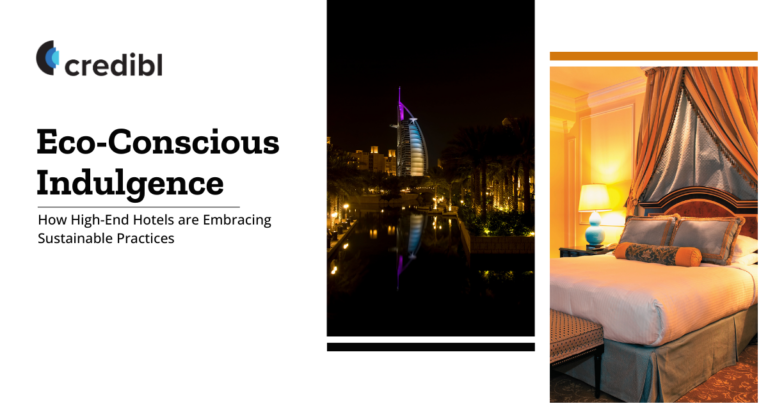Introduction
In the world of luxury hospitality, a silent revolution is unfolding. High-end hotels, long associated with extravagance and opulence, are now leading the charge in embracing sustainable practices. For discerning travelers, luxury is no longer just about indulgence; it’s increasingly about making responsible choices that align with their values. This blog researches how luxury hotels are evolving to meet these new expectations, seamlessly blending opulence with eco-consciousness.
Current Trends in Sustainable Luxury Hospitality
The luxury hotel industry is witnessing a significant shift towards sustainability. A prime example is Fogo Island Inn in Canada, a beacon of social enterprise and environmental stewardship. This establishment not only offers a unique stay but also invests every penny earned back into the local economy. Meanwhile, 1 Hotels, a brand known for its sustainable luxury hotels, is expanding its global footprint with new properties that prioritize environmental responsibility without sacrificing luxury.
The Taj Mahal Palace, Mumbai, exemplifies environmental stewardship in the hospitality industry, having achieved the landmark feat of being fully powered by renewable energy. This initiative is part of IHCL’s ESG+ framework, Paathya, reflecting its commitment to sustainable practices. The hotel’s comprehensive approach includes water conservation, waste reduction measures, and the phasing out of single-use plastic, setting a new sustainability benchmark and advancing towards a low-carbon future. Additionally, the UK’s Voco Zeal Exeter Science Park exemplifies how luxury and sustainability can be accessible, offering a net-zero carbon hotel experience.
The Role of Technology and Innovation
Innovation and technology play pivotal roles in the sustainable transformation of luxury hotels. Personalized experiences, a hallmark of luxury, are being enhanced through AI and data analytics. These tailored personalizations enhance the hospitality while contributing to sustainable operations. For instance, biometric screening for faster check-ins and a data-driven personalization approach exceed guest expectations and contribute to a more efficient, environmentally friendly operation.
Local and cultural authenticity is another trend gaining momentum. Luxury hotels are increasingly incorporating local art, and cuisine, enhancing the guest experience while promoting sustainable, local economies.
Sustainable Practices in Food and Beverage Management
The luxury hotel industry is also revolutionizing its approach to food and beverage management. A significant challenge is the reduction of food waste, which contributes substantially to global greenhouse gas emissions. Hotels are adopting strategies like sourcing local produce and curbing plate waste to address this issue. These initiatives reduce the carbon footprint and offer guests an authentic taste of the locality, enriching their journey.
Energy Efficiency and Waste Minimization Strategies
The luxury hotel industry is taking giant strides in energy efficiency and waste minimization, incorporating sustainable design and technology for a greener future. Cornell’s Center for Hospitality Research highlights how developers and brands are now focusing on eco-friendly properties that reduce environmental impact while enhancing the guest experience. Modular construction, for example, is emerging as a sustainable alternative in hotel design, offering benefits like shorter development timelines and reduced construction waste.
Moreover, leveraging data to improve operational efficiency is gaining traction. Customer relationship management systems are being utilized to reduce energy consumption and waste, aiding in achieving sustainability goals. Additionally, smart infrastructure in hotels, such as data-collecting software integrated with building systems like HVAC, is enhancing energy usage understanding, and facilitating preventative maintenance.
Engaging Guests in Sustainability
Sustainable luxury goes beyond the built environment, encompassing everything from marketing to operations. Hotels are increasingly involving guests in their sustainability journey. This includes improved air quality in urban hotels, contributing to a cleaner and quieter environment for guests. Additionally, the use of sustainable materials is becoming a status symbol in luxury hotel design. Designers are exploring creative ways to make sustainable materials appealing, using natural dyes for wall coverings and fabrics, and integrating local artisanal work to reduce emissions associated with transportation.
Hotels are also adopting new approaches in materiality, like 3D printing of organic materials, to offer sustainable and luxurious experiences. This is complemented by carbon-sequestering biomaterials and concrete alternatives, providing practical solutions to traditional building materials.
Challenges and Criticisms
Despite these advancements, the industry faces challenges, including balancing luxury with sustainability and overcoming the perception of ‘greenwashing’. Consumers are becoming more educated and are asking detailed questions about sustainability practices. The industry needs to define clear objectives and partnerships from the planning stages to ensure alignment with sustainable goals.
The Future of Sustainable Luxury Hospitality
Looking ahead, the hotel construction pipeline continues to boom, with a record-high number of projects in the pipeline. This growth is not just in numbers but also in the commitment to sustainability. Top hotel construction, engineering, and architecture firms are increasingly focusing on sustainable practices, as evidenced by the rankings in Building Design+Construction’s 2023 Giants 400 Report.
Conclusion
In conclusion, luxury hotels are not just adapting but are actively leading the way in sustainable practices. From energy efficiency to engaging guests in sustainability, these establishments are setting new standards in luxury hospitality. This transformation is not only beneficial for the environment but also for the guests who seek responsible indulgence. As we move forward, it’s clear that sustainable luxury is not just a trend but a fundamental shift in the hospitality industry.
Discover how Credibl ESG empowered a major hotel group to manage complex supply chain & emission data for seamless ESG reporting. Read our case study here!







